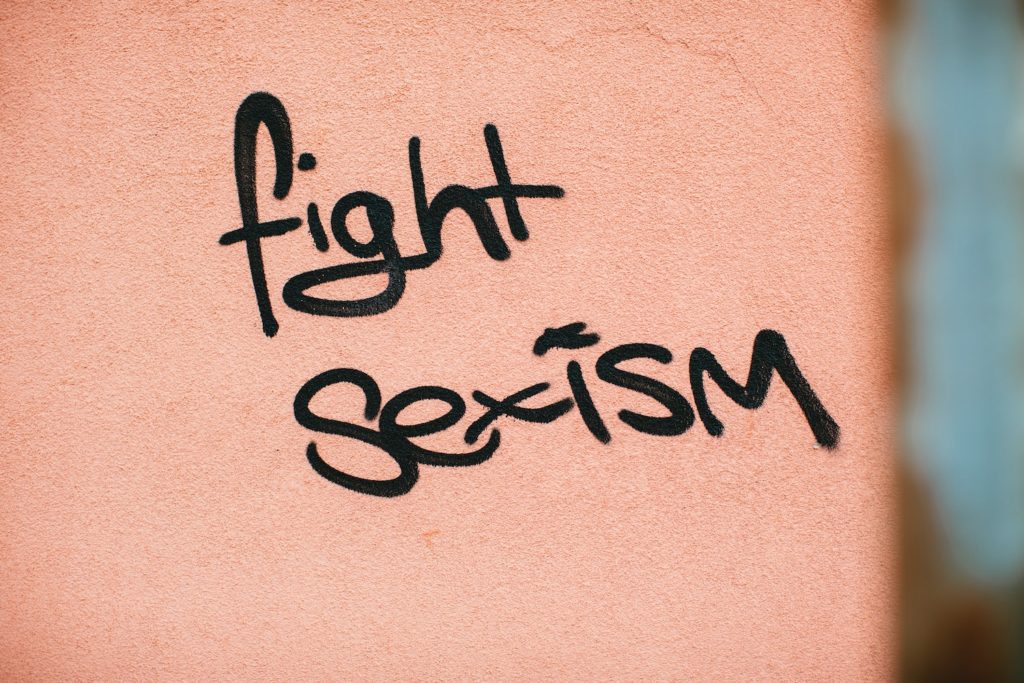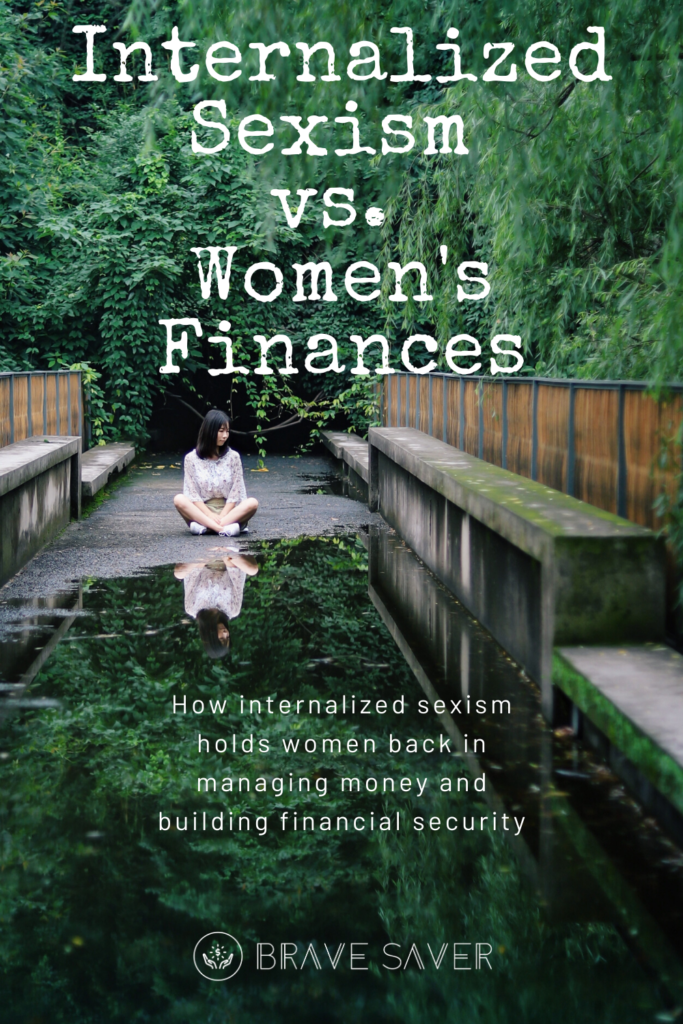
Palm trees stretched over dirt or xeriscaped lots, against the dusky blue of a twilight sky and the orange glow of streetlights. Driving around my hometown of Las Vegas with my dad, he and I discussed the tensions I felt as a new mom. How I felt torn between my desire to work and build a career, and the messages I’d always received that good moms don’t work outside the home.
To my dad, there was no conflict between those things. “Who’s even saying anything to you about working?” he asked, in response to my fear of being judged by my family and religious community for my choice to work rather than stay at home.
I was stumped — because no one had said anything — now that I was a mom. And yet, no one had to say a word for me to know some people were judging that choice. And more than that, I knew that I had wondered if I could be a good mom while working.
All I could do was say, “No one, Dad. No one needed to. Not when I’ve already heard it my whole life.”
What's in this post
Internalized sexism: Misogyny that lives in your head rent-free
In my post about why moms feel they have to justify their choices, I wrote a bit about this struggle. But even since publishing that post, I’ve thought about it.
I had the sense that there was some unspoken something at the core of this all. Some thread that was there, through my youth, college and career choices, leaving the Mormon church, starting a family, through to my current choices.
What is this internal force pushing women to conform to, rebel against, or consider gender norms at all when we decide how to live our lives? Or when we’re making career moves, financial decisions, or managing our money day-to-day?
And then I found the right term for it: Internalized sexism.
What is internalized sexism?
Marginalized genders are as susceptible to sexist beliefs as anyone, of course. But when we hear sexist ideas, they aren’t projected onto a different, othered group. They’re about us.
Internalized sexism: Taking in sexist messages and beliefs about the inferiority or limited role of women, and directing those messages and attitudes at ourselves or other women.
It’s a form of internalized oppression, which any marginalized or disenfranchised group can experience. Women aren’t the only people who experience internalized sexism, either; marginalized genders often get the same or similar messages about their inferiority based on gender identity.
These beliefs become part of our worldview, influencing behavior and choices, including how we view and judge ourselves and other women. Misogynistic ideas and beliefs seep into our psyches and haunt us, making us question ourselves, put ourselves down, and feel that we’re never enough.
The feel and flavor of internalized sexism is unique to each woman, shaped by how our femininity intersects with our other identities and cultures of family, religion, race, nationality, and ability.
My story of who I should be as a woman started at church, in a high-demand religion that centers its beliefs on traditional gender norms. Slowly, the stories I was told became the thoughts and beliefs I had about myself. I should always push myself to be better. I should be attractive, but not immodest. I must be good at feminine things, but also not too good or interested — women’s interests are silly and frivolous, after all.
Eventually, no one needed to tell me I was the wrong kind of girl or woman. I was telling myself that every day.
The result? I was caught continuously between my authenticity, genuine desires and beliefs, and the pressure to conform to the sexist beliefs I held.
Internalized sexist myths that harm women’s financial health

As I’ve become more aware of the sexist beliefs and ideas haunting me, I’ve noticed how they crop up when facing financial choices and career decisions. Whether I felt the need to comply with or push back against this voice, it’s still been there, placing its finger on the scale and weighing in on each career move or money choice.
Here are some of the most common forms our internalized misogyny takes in the realm of money and career, based on my research and personal experience.
Myth: “I’ll defer to others on big money decisions.”
The follow-up to “Women can’t be trusted with money”? It’s “So they’ll have to rely on someone else” — and be financially dependent on others.
Despite a fierce independent streak, my internalized misogyny made me susceptible to sneaky marketing and ineffective financial advice. It even led to choices that forced me to rely on others financially. I followed my parents’ advice against getting a credit card in college, for example. But as a result, I didn’t build credit — so when my husband and I got our first apartment together, I had to lean on his good credit history. My name was left off the lease altogether.
“From an early age, we are conditioned to ignore the voice within when considering who we are and what our goals are, and instead to look outward — to our family, friends, church, community, and even our critics.”
Glennon Doyle
When it comes to planning for their own financial futures, only 23% of women take the lead. More than half (53%) defer to their spouse to make critical long-term money decisions. Instead, 85% of women are in charge of day-to-day expenses and budgeting. The message: we can’t be trusted with the big, important, long-term financial moves; but we’re welcome to take on the ever-present labor of mundane money tasks.
This dynamic doesn’t make for a healthy partnership, however, and works against women’s financial security. Just ask women who were married (widows and divorcees), 98% of whom say they would urge women to be more involved with their finances.
Myth: “I don’t know what I’m doing with money.”
The most common sexist belief about money: women are worse with money than men. We’re prone to frivolous or emotional spending, less capable of making rational financial decisions, and less knowledgeable about money topics. If you have internalized these kinds of beliefs, they can show up as:
- Feeling like you don’t know anything about money and can’t learn
- Mistrusting your own judgment and ability to manage money responsibly
- Fearing or avoiding money management or financial decisions
- Feeling disempowered with money; that you’re helpless to improve your situation or a hopelessly lost cause
- Focusing disproportionately on money mistakes or perceived failures, while ignoring success or improvements
One study of conversations between female friends found that statements of ignorance were women’s most frequent expressions of internalized sexism — specifically, saying “I don’t know.” When I read this, it stung — because “I dunno” is one of my favorite filler phrases. But as the study points out:
Women say “I don’t know” when they do know.
Consider investing: women invest less often than men do, often due to a lack of emphasis on women’s finance education. Yet when women get started investing, they save more and get better returns and results than men.
I’m a finance writer who literally learns and teaches about money for a living. And yet I still can feel like I’m not knowledgeable or financially responsible enough to share what I know without first endlessly researching, learning, and deliberating.
Having a sense of ignorance and uncertainty around money has undermined my ability to be the financial authority in my life, and trust my own financial judgment and knowledge.
Myth: “Spending money on myself is wasteful.”
Taking on all of these critical messaging of women and how we’re supposed to be can make spending complicated.
I’ve noticed sexist beliefs popping up when I’m spending:
- I feel guilty when spending on myself and making purchases that only benefit me. For women who share finances or have dependents, spending on ourselves can feel like “taking away” from our family. Or just a nagging sense that I, as a woman, am somehow less entitled to the benefits of a financially healthy household.
- I struggle to justify “feminine” purchases, from makeup to an astrology reading, even if the product is something I want and can afford to buy. And generally, expenses labeled as a “waste of money” in the personal finance space are often gendered. From lattes to cocktails, shoes or skincare products — these are “money-wasting” purchases often associated with female buyers.
- I sometimes feel pressure to spend on “feminine” things that I don’t care about to adequately perform femininity. When I was younger, it was manicures and waxing body hair. Now it’s anti-aging treatments and hair dye to cover grays. Ironically, the same things that many women get shamed for buying — other women will feel like they “have to” spend on. On top of this, consumerism is marketed to women in insidious ways, packaged as self-care, convenience, or retail therapy.
Myth: “My career or income doesn’t matter that much.”
Several sexist beliefs about women can limit our earning power and career ambitions. That we’re less capable than men, have less inherent ambition and drive for work, and are naturally better-suited for and more concerned with family life. Or if we’re coupled, we may feel our career is less important than our partner’s.
As one study puts it, the belief is that women’s “commitment to family is primary by nature, so their commitment to work has to be secondary.”
This belief has been the frontlines of fighting my own internalized sexism. I expected to be a stay-at-home mom, and never planned to have much of a career — let alone aspire to be my household’s breadwinner. I made choices in college and at work that centered my family life over my own income growth and financial security.
Being raised with sexist beliefs, and internalizing them, does lead to women earning less. Women raised in areas with highly sexist attitudes are less likely to be employed, and earn less when employed, than women raised in more progressive areas. Even worse, this gap in employment and earnings persists even if women move from more- to less-sexist areas.
But that’s how internalized misogyny works: the limiting beliefs we have about our earning and career potential as women are ingrained early on — and then we carry them with us.
Our internalized misogyny is not our fault

In the process of researching this piece, I had so many “Wait, I do that” moments — followed by guilt. Feeling like I’m failing at being a feminist, a good role model, the kind of woman I want to be.
Every woman struggling to shut up the sexist voices and beliefs in her head needs to ignore them for just a moment and hear this:
Your internalized sexism is not your fault; nor does the burden to compensate for this sexism fall on you.
Misogyny is not inherent — you were taught to view yourself as lesser based on your gender. That’s not your fault. It does not mean you are bad or have failed in any way if threads of sexist beliefs and ideas were woven into the fabric of who you are.
The Equal Pay Act that banned wage discrimination based on gender is only 57 years old. Women couldn’t get credit cards on their own until 1974. State laws that gave husbands control of jointly owned property weren’t overturned until 1981.
And today, the gender pay gap persists. The finance and investing world is still overwhelmingly male and discriminatory in subtle ways. Personal finance advice aimed at women focuses on budgeting and cutting spending — in contrast, advice to men promotes earning more, investing, and growing financial literacy.
Our patriarchal society that views women as less capable with money — then blames our poor behavior with money as the reason these sexist ideas exist. It also pressures women to deprioritize earnings and take on unpaid caregiving roles, and when women inevitably earn less, it blames the pay gap on women’s career “preferences” for flexibility and family time.
But the financial inequalities between men and women result from patriarchal and sexist systems — not the unique preferences and choices of women. Women don’t care more or less about their careers or families than men, and we aren’t inherently more risk-averse, and we aren’t simply less interested in investing. All of that is more sexist bullshit. It’s not on us.
But we can change our views and halt the financial damage of internalized sexism
It’s not our fault of responsibility as women to “solve” sexism by leaning in and doing things that we don’t want to.
We can recognize and address our learned misogyny and cease its harm to ourselves and other women.
We can see our internalized sexism for what it is: learned beliefs that we held onto or followed because we felt, for whatever reason, we had to. Maybe it bought us acceptance or approval. Perhaps it gave us peace that we were making the best choices, at least for those around us. For some of us, adhering to sexist guidelines even kept us safe, protecting us from aggression or retaliation.
Whatever the reasons we believed our inner sexist and caved to its pressures, it’s important to look at the tradeoffs of doing so — the harm to our sense of self-worth, of our autonomy, or our financial security and future.
As women, we must own our power and influence as well. We can build our own acceptance, belonging, and safety free of gendered oppression — or to at least work toward it. We can use our voices to educate — and our votes and politics to enact change with policies that further women’s financial interests.
And most of all: We can challenge our sexist ideas and beliefs, again and again, until we believe more in our worth, abilities, and competence.
We have the power to evict our inner sexists.
They don’t get to live in our heads rent-free anymore. They don’t get to guilt us for our spending, caution us against negotiating for a raise, or keep us from the financial growth and security we deserve.
Recommended resources:
- “By the Numbers: How Black Women Are Really Doing Financially” by Dayana Yochim for HerMoney covers the basic financial stats for Black women earners, borrowers, and entrepreneurs.
- “It’s Time to End the Myth That Women Are Bad with Money” panel from the 2019 Women in the World Summit explores the common messages women hear about money, how this affects our financial behaviors — and some ideas for how women can start changing our relationships with money.
- “Here’s Why Women Are Told They Spend Too Much Money” from Refinery29 provides a quick overview of how sexism in finance affects women’s financial lives — in a wonderfully satirical tone (and with the help of a dildo).
- “Meet The Women Of The Financial Independence Movement” from Tread Lightly, Retire Early is a directory of more than 170 women who are financial content creators, podcasters, authors, and money coaches. Get the money guidance you need without a side of sexism.


Photos by samuel lopez, Raychan, Markus Spiske, and Xan Griffin on Unsplash




2 Comments
Angela @ Tread Lightly Retire Early
June 28, 2020 at 3:27 amThis post is SO good. Missed it the first time around. Glad you re-shared on Twitter.
Jen Hun
March 8, 2021 at 2:52 pmI’ve never judged a mom on having a career or staying home. I could careless what others choose to do. I worked the first 2 years of my first borns life and stopped working when we moved overseas and I was pregnant with our 2nd child. I could careless if people judge me for our choices. I think we need to worry less about what we think others think.